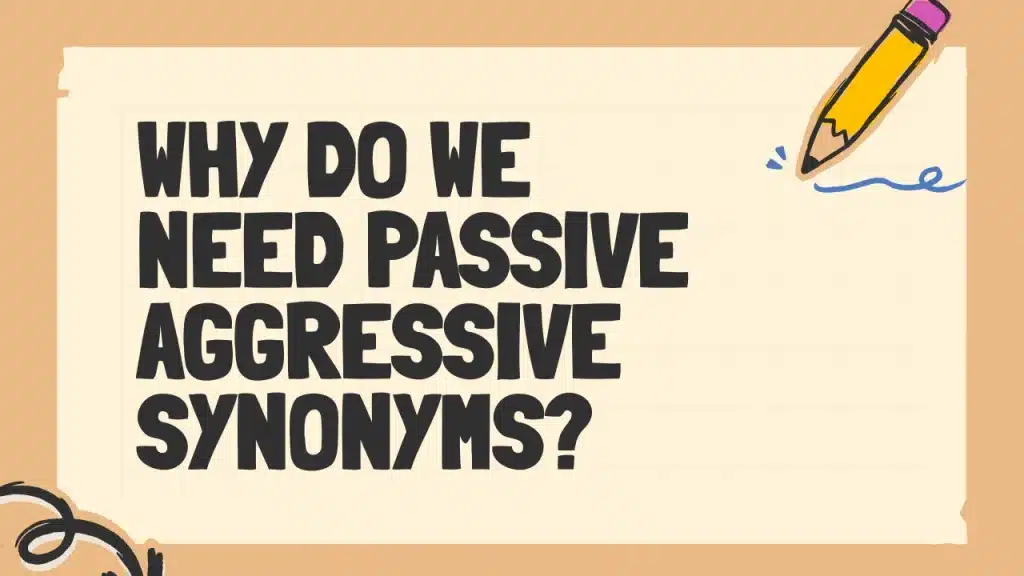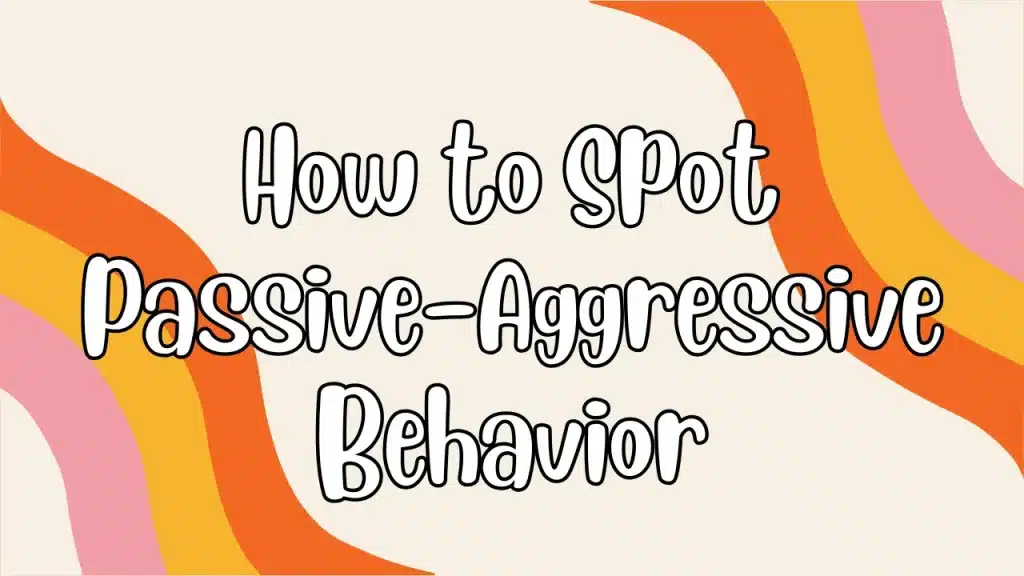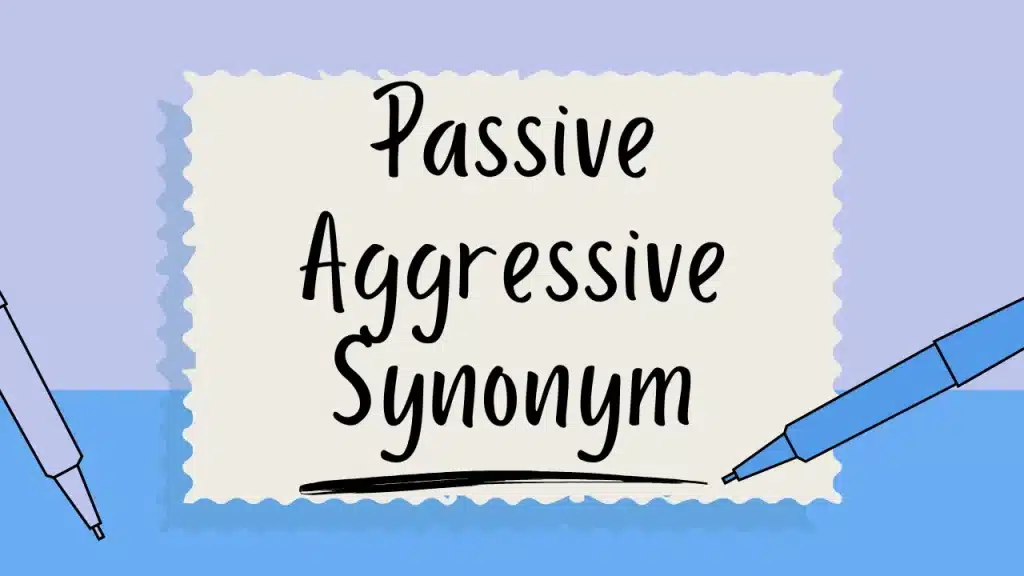We all encounter subtle negativity in our daily interactions. Whether at home, work, or school, people sometimes express frustration in ways that aren’t direct. This behavior is often called passive-aggressive, and finding the right passive aggressive synonym can help us better describe these actions. With that being said synonym expressions are useful when trying to soften the tone during conversations. But when someone hides their anger behind politeness or sarcasm, we need the right words to explain it.
Understanding what makes someone passive-aggressive is key to spotting this behavior. The term refers to expressing negative feelings in indirect ways. For example, someone might say they’re “fine” but clearly act upset. Instead of addressing an issue directly, they might give the silent treatment or make sarcastic remarks. Recognizing these patterns is the first step in finding the right language to deal with them.
20 Ways To Say Passive Aggressive Synonym
Absolutely! Below are 20 ways to say “passive aggressive”, each with a clear example to help you understand how they work in everyday use. These all serve as it expressions depending on tone, context, and behavior:
1. Backhanded
Example: “Wow, you look good for your age!”
👉 This sounds like a compliment, but it’s really an insult in disguise.
2. Sarcastic
Example: “Oh sure, I love redoing work because you forgot to save it.”
👉 A sarcastic tone reveals hidden frustration.
3. Subtly defiant
Example: He agreed to help but kept delaying it all day.
👉 Quiet refusal instead of open disagreement.
4. Indirectly hostile
Example: “If only some people knew how to use a calendar.”
👉 Targeting someone without naming them.
5. Covertly antagonistic
Example: She smiled while telling me I wasn’t chosen—like it was good news.
👉 Hostility hidden beneath politeness.
6. Resentfully compliant
Example: “Fine. I’ll do it, even though no one else ever helps me.”
👉 Doing the task with bitterness instead of true agreement.
7. Underhanded
Example: He told the boss I was late—after saying he’d cover for me.
👉 Sneaky behavior behind someone’s back.
8. Two-faced
Example: She praised my idea in front of me but trashed it in the meeting.
👉 Friendly upfront, critical in private.
9. Veiled hostility
Example: “It’s amazing how some people always have an excuse.”
👉 A masked way of expressing anger.
10. Snide
Example: “You finally made it on time. That’s rare.”
👉 A sly comment meant to sting.
11. Disguised resentment
Example: He says “no problem” but slams doors and sighs heavily.
👉 Actions speak louder than polite words.
12. Grudging
Example: She handed over the report but wouldn’t look at me.
👉 Doing something reluctantly, with clear displeasure.
13. Icy politeness
Example: “Thank you so much for your help,” she said, without a smile.
👉 Cold tone under a polite phrase.
14. Silent resistance
Example: He just stared at me after I asked him to help.
👉 Refusal without words.
15. Masked anger
Example: “I’m not mad,” she said, but didn’t speak to anyone all day.
👉 Pretending to be fine when clearly upset.
16. Feigning innocence
Example: “Oh, I didn’t realize that would upset you.”
👉 Playing clueless to avoid confrontation.
17. Passive resistance
Example: He missed the meeting—again—and said nothing about it.
👉 Avoiding responsibility without direct conflict.
18. Mocking tone
Example: “Yeah, great idea. Let’s all just work 24/7!”
👉 Voice tone makes it clear they disagree.
19. Pretend agreement
Example: “Sure, whatever you say.”
👉 Saying yes, but with an attitude that screams no.
20. Indirect aggression
Example: She corrected my grammar in every email reply.
👉 Constant nitpicking to annoy or dominate.
Why Do We Need Passive Aggressive Synonyms?

Using different words to describe passive-aggressive behavior helps in both writing and conversation. It can also prevent misunderstandings. A passive aggressive synonym gives you more freedom to express feelings or explain someone’s actions without sounding repetitive. For example, if you’re writing a report about workplace dynamics or describing a friend’s behavior in a blog, you’ll need a variety of expressions to keep your language clear and engaging.
Sometimes, the word “passive-aggressive” may sound too harsh. That’s why people look for alternatives to explain the same behavior without sounding rude. Some synonyms can be more specific or more appropriate depending on the situation. Let’s look at some useful options.
Best Passive Aggressive Synonyms and When to Use Them
Here’s a list of common it options and what they usually mean:
| Synonym | Meaning |
|---|---|
| Backhanded | A compliment or statement that also includes an insult |
| Indirectly hostile | Expressing anger or resentment without being open about it |
| Resentfully compliant | Agreeing to do something but with visible annoyance |
| Subtly defiant | Quietly refusing to follow rules or expectations |
| Two-faced | Acting friendly in person but speaking badly behind someone’s back |
| Sarcastic | Saying something that means the opposite, often in a mocking tone |
| Underhanded | Secretly dishonest or sneaky, often in actions rather than words |
| Veiled | Something hidden or disguised, like a veiled threat |
Each of these words can replace “passive-aggressive” in different contexts. They’re useful when you want to describe someone’s behavior more precisely. If someone keeps saying “whatever you want” but clearly disagrees, that could be resentfully compliant behavior.
Real-Life Examples
Let’s imagine a few short scenarios where these synonyms come in handy:
A co-worker keeps making “jokes” about your performance in meetings. Though it sounds funny, it’s clearly a backhanded way of criticizing. A friend agrees to help you move but complains the entire time. This could be called subtly defiant or even resentfully compliant behavior.
Sometimes, people express feelings with sarcasm. “Oh, great job on being late again!” might sound cheerful but is clearly sarcastic. In such moments, using the right passive aggressive synonym helps you explain what’s really happening.
The Link Between Passive Aggression and Communication Issues
Most of the time, passive-aggressive behavior happens because people don’t feel safe expressing their emotions. They might worry about conflict or rejection. Instead of saying “I’m upset,” they show it through cold behavior or minor annoyances.
Understanding these behaviors helps in communication. It also helps when writing or speaking professionally. When trying to describe someone who won’t say what’s bothering them but shows it, using a passive aggressive synonym gives you clarity.
How to Spot Passive-Aggressive Behavior

There are signs that someone is being passive-aggressive, even if they don’t say it outright. Here are a few:
- Frequent sarcasm or “jokes” that don’t feel kind
- Doing things slowly on purpose to annoy others
- Saying one thing but doing the opposite
- Giving the silent treatment
- Acting forgetful when they’re not
When you notice these signs, you can begin to describe the behavior more accurately using terms like veiled hostility or indirect aggression.
Improving Your Vocabulary
Enhancing your emotional vocabulary helps in managing relationships better. Instead of just saying “they’re being passive-aggressive,” choosing a more specific term can make your point clearer. This is especially useful in writing, whether you’re creating content, journaling, or sending professional emails.
For example, “Her tone was indirectly hostile, making the meeting uncomfortable,” is more descriptive than simply labeling someone as passive-aggressive. The more detailed your language, the better you can address and resolve the issue.
Midway through handling people or their behavior, we also deal with many tasks. When juggling responsibilities, knowing a time management synonym can help structure both work and emotional labor.
When to Use It and When to Be Direct
Using these synonyms can be powerful, but it’s also important to foster open communication. If you find yourself using too many of these terms to describe others, it might be a sign that honest conversation is needed.
Being able to call behavior covertly antagonistic or sarcastic is helpful, but encouraging clear and kind dialogue is even better. Words shape how we think, and finding the right passive aggressive synonym can help us think more clearly about what we experience.
Final Thoughts
Language is a powerful tool, especially when dealing with subtle behavior. Whether you’re managing emotions at home or navigating conflict at work, having the right words matters. A passive aggressive synonym can make your writing more powerful and your speech more respectful. It can help you identify what’s really going on and find better ways to respond.
By exploring alternatives like backhanded, subtly defiant, or resentfully compliant, you’re not just expanding your vocabulary—you’re improving your emotional awareness. These words can help you build stronger relationships and clearer communication.




